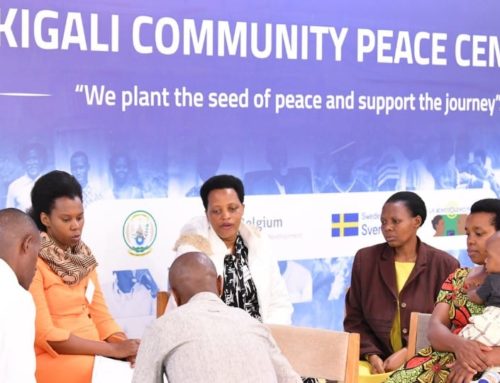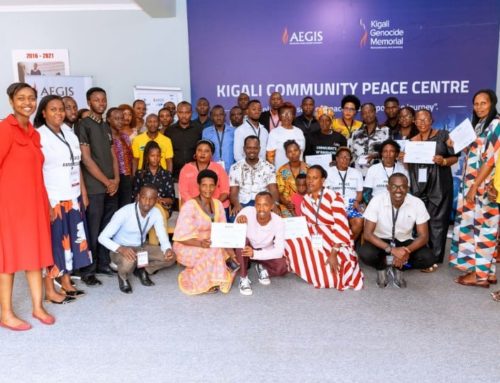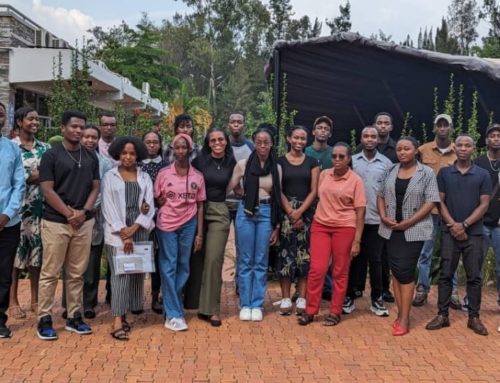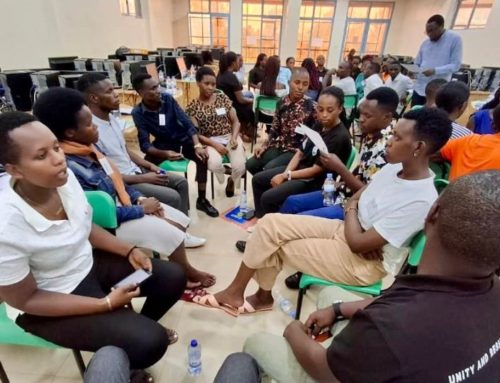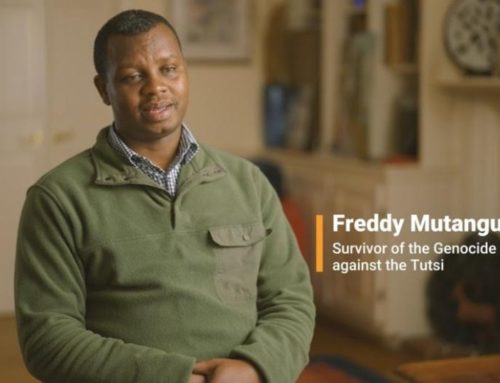Today Professor Elim Lokapel, formerly the Aegis Trust’s Representative in Kenya and the Principal of Mount Kenya University’s Kigali Campus, is being laid to rest in Turkana, Kenya. He died as the result of a progressive illness, aged just 48. A great believer in the importance of peacebuilding, his comments in the video above were given during an Aegis interview in 2014.
Despite the onset of his illness, in 2015 Professor Lokapel shaped and led the ‘Champions Walk for Peace’ in Kenya – including undertaking the full 836km walk with Kenya’s star athletes, among them Wilson Kipsang, Ezekiel Kemboi and Tegla Loroupe. His personal courage and drive were strongly evidenced in this short film about the mapping of the route. Widely reported at the time in national and international media, the walk had a significant impact along its route through Kenya’s conflict-affected seven northern counties (see for example this report by the Daily Nation).
Building on the Professor’s legacy, the Aegis Trust will stage a 1000km ‘Kenya Peace Torch Relay’ around the UK in July 2016, aiming to raise funds through participant sponsorship for creation of a peace school between the Turkana and Pokot in northern Kenya (see www.walkforpeace.co.ke).
Following is the text of an address prepared for Professor Lokapel’s funeral by the Aegis Trust’s Regional Director, Freddy Mutanguha.
FUNERAL ADDRESS
“Peace is a responsibility of everyone in the World. Peace is not something one can give; peace is like building a house. It has a foundation. And for that, you need to have resources, to make sure that this peace is built.”
The words of Professor Elim Lokapel, our dear friend and colleague, who understood and shared the burden of peacebuilding – most especially in Kenya.
His passing is not only a personal loss for us, but one for east Africa and for the whole field of peace-building.
At this sad time, our hearts go out to his family and friends. We are with you in grief, but we also want you to know that we share your gratitude for Lokapel’s life. You can be proud of what he achieved, and we should celebrate that together. We should also build on it.
We first encountered Professor Lokapel when as Principal of Mount Kenya University in Kigali, he brought students to participate in our summer course on peacebuilding.
His personal charm and charisma were immediately evident. We also quickly came to realise that beneath that infectious smile lay a steely determination to do whatever it took to help his own people, the communities of Northern Kenya, to overcome a rising tide of ethnic division and violence. Whatever the cost might be to himself.
Having explored the Kigali Genocide Memorial, and Aegis’ work with young people in Rwanda, the Professor became a powerful advocate for the application of Aegis’ peace-building principles in Kenya and beyond.
By the time he formally joined the team in 2014 on a one-year contract as Aegis’ Representative in Kenya, he had already been supporting the charity on a voluntary basis for many months.
His arrival coincided with an increase in the troubles of the seven counties. From 2014 to the middle of 2015, over 600 people were killed – and over 400,000 were driven from their homes.
The Professor knew that action to make a change was needed fast. With limited resources, it would have to be innovative, eye-catching and highly symbolic, capturing the imagination and the hearts of the community.
It would also need a unifying public face. Who better than Kenya’s star athletes, he concluded. So many of them come from the north – and whatever their ethnicity, the whole country cheers when they run. If they spoke out for peace, people would listen.
In Rwanda, we had recently staged a symbolic torch relay for peace around the country as part of events to mark the 20th commemoration of the genocide against the Tutsi…
And so an idea began to form in the Professor’s mind. Kenya’s top athletes should lead a torch relay, on foot, through the seven counties. It would be a Champions Walk for Peace. And along the way, it would invite young and old, schoolchildren and warriors, people and politicians to join in. To take steps, literally, for peace.
The first time he told me about his idea for this walk, I thought he was crazy. A thousand kilometres? On foot? In a month?! But as all of you who knew him can testify, the Professor was nothing if not persuasive. OK, we said, yes – let’s do the walk. But not yet. Let’s allow more time to prepare, and do the walk in 2016. Would it be wise to rush it? The professor was adamant. It had to be done, and without delay. Now or never.
Looking back, I can’t help wondering if his incredible urgency wasn’t also driven by a sense of his own impending demise. If we had waited until the summer of 2016, he would not have been there to drive the Walk for Peace as he did – first personally mapping the route, and then walking all 836 kilometres of it with the athletes, using all his contacts and consummate diplomacy to bring together people at every level of society along the way.
While national and international media documented the Walk for Peace at the time, months later its deeper impact was highlighted in reports such as those from the Daily Nation in November and December 2015.
On 30 November, the Daily Nation reported:
“The peace now being enjoyed by locals once more, has not come overnight nor without effort. It has taken many months of toil and rigorous campaigns
Lokapel himself commented to the Daily Nation,
“It’s good peace is slowly returning to the region. We’ve been losing a lot of manpower and development due to insecurity.” He also urged: “Our leaders should continue supporting peace and reconciliation efforts.”
Professor Lokapel, the work you started here is not over. Across Kenya and around the World, the mission continues. This summer, a year after the first Walk for Peace, World record-breaking athletes will lead a 1000-kilometre Kenya Peace Torch Relay in the UK, aiming to engage a thousand members of the UK public in fundraising for creation of a peace school on the borders between the Turkana and Pokot.
Thanks to you and your indomitable drive, an incredible foundation for peace has been laid. All of us here today owe it to you to build on that legacy, to which you gave your life.
As we all know, the Professor was a committed Christian. In Matthew 5 verse 9, Christ says, “Blessed are the peacemakers, for they will be called Children of God.”
There is no doubt in my heart that there are men and women alive today because of the reduction in violence brought about by this peacemaker: a true Child of God, who has earned his eternal rest.
Some part of me can’t help wondering, however, if even now our beloved Professor isn’t busy advocating with the Almighty for a little more divine assistance in our peace-building efforts here on Earth. It would be entirely in character.

